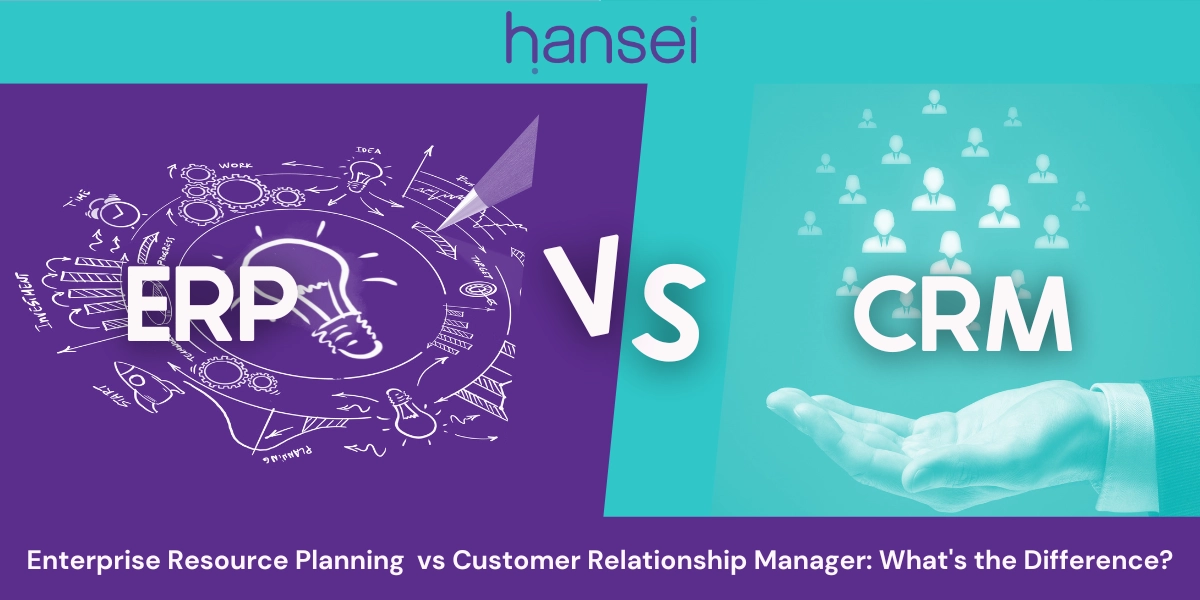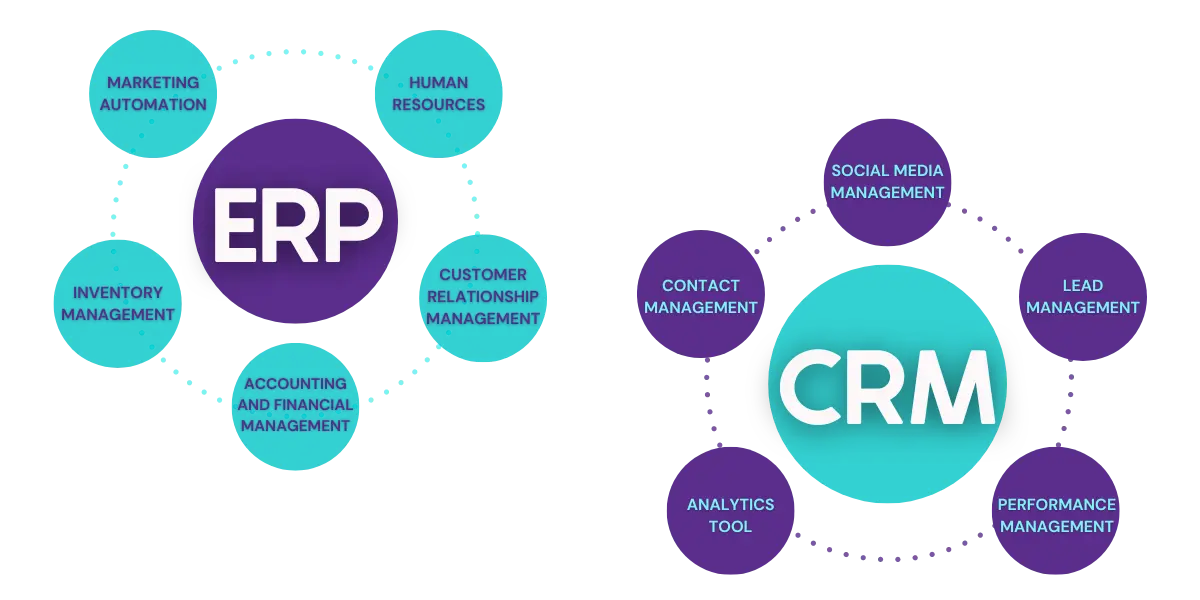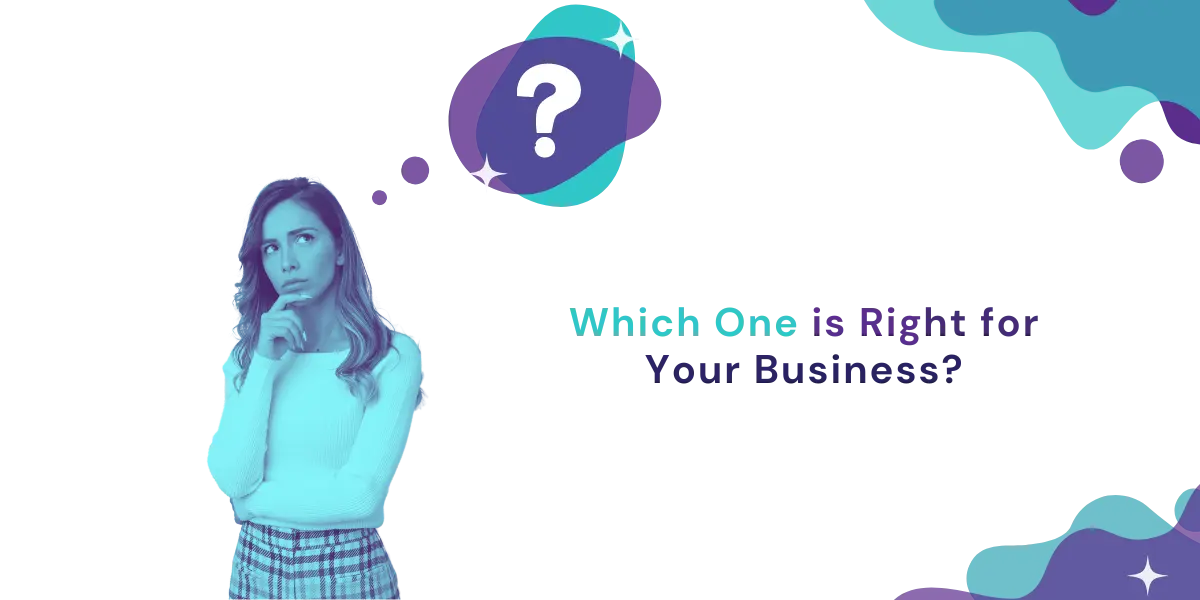Blog

Table of Contents
What sets apart the Customer Relationship Management System (CRM) from the Enterprise Resource Planning System (ERP)? While both softwares aim to improve business operations and increase return on investments, their core functionalities are distinct. Despite similarities, these systems serve different purposes and work in tandem to elevate your business to the next level.
In essence, CRM and ERP are business applications that store and analyze data using a relational database. They are accessible to users through software as a service, which can be managed in-house, while customers can access it through the cloud. While implementing these systems may not be mandatory, it can be crucial for staying competitive in today’s business world. Learning their fundamental differences can exponentially enhance your organization’s productivity and profitability.
The Key Differences between ERP and CRM
At its core, ERP and CRM are fundamentally different. ERP is primarily used by the finance department to manage data and is commonly known as the “back office” as it focuses on the entire organization. On the other hand, CRM systems are used by the sales force, customer service departments, and other teams and are commonly referred to as the “front office” as they collect data on the customer-facing side of the business.

Here are some crucial functions that highlight the fundamental differences between CRM and ERP systems.
- CRM systems focus on customer relationship management, while ERP systems deal with business and operations management. Combining these systems can enable an organization to collect data during the initial transaction, store it centrally, and update it in real-time.
- ERP systems automate and oversee daily activities such as project management, accounting, risk management, compliance, and supply chain management to manage an organization’s core operations effectively. In contrast, CRM systems improve the relationship between an organization and its clients, leading to a better customer experience and higher satisfaction.
- While some ERP systems may include a CRM component, CRM software systems do not include ERP components. Neither system can substitute the other because they are not designed to do so. An ERP system streamlines business operations to reduce overall business expenses, while a CRM system drives sales to the business.
- ERP solutions are crucial in managing supply chains and ensuring manufacturers can respond to market fluctuations. In contrast, CRM tools make information about customer interactions available to anyone who might need it.
- ERP systems offer a holistic view of all business operations, including supply chain management, to improve supply chain management. On the other hand, CRM systems enable organizations to store customers’ contact information, record service issues, and manage marketing campaigns at a central location.
- CRM systems create customer profiles, automate marketing campaigns, ensure proper customer relations, provide marketing campaigns, chatbots, and help centers, and make it easy to sync customer-facing teams. In contrast, ERP systems help with payroll, order processing, inventory management, streamlining operations, and provide a snapshot of the entire business.
Modules of ERP and CRM Systems
The ERP system comprises various modules, but the top five modules are:
- Accounting and Financial Management
- Inventory Management
- Marketing Automation
- Human Resources
- Customer Relationship Management
In general, CRM consists of the following five core modules: –
- Contact Management
- Lead Management
- Analytics Tool
- Performance Management
- Social Media Management

ERP vs. CRM – Which One is Right for Your Business
It’s evident that ERP emphasizes the back-end process, while CRM emphasizes the front-end process of business and customer management. While both systems function best in their respective departments, it’s recommended to search for an all-in-one solution to meet your business needs.
Any organization that interacts with customers can benefit from using CRM software systems. The industries that commonly use CRM tools include hotels, retailers, real estate companies, banks, and other businesses that handle customer data extensively. If you have a vast customer database and focus on building long-term customer relations, consider using a CRM tool.
Likewise, if you operate in industries such as manufacturing, construction, distribution, healthcare, and professional services, consider using ERP systems. ERP is vital for keeping all complex operations and processes aligned.
CRM systems cannot handle finance and budget inventory, while ERP systems cannot provide the best customer information. Before investing in either software type, ask yourself the following questions.
- What is your core business model? If your business revolves around customers, then CRM can help manage customer data, while ERP may be more suitable for managing resources and assets.
- Are you looking to grow your business or manage your growth? CRM can assist in attracting new customers, while ERP can streamline the process to assist them.
- How much does your organization need to grow? ERP can manage various processes across the entire organization, leading to effective data organization. In contrast, CRM can offer insight into profitability and sales volume.
- What are your company’s weaknesses? Both software systems can improve business efficiency beyond their primary functions. Use these systems to identify and improve inefficient processes.
To sum up, the decision between using ERP or CRM systems depends on the unique needs of your business. Take sufficient time to evaluate your business requirements carefully. If your business has a complex financial structure and a smaller customer base, integrating ERP into your business model may be more beneficial. Conversely, if your business has an extensive customer base and relatively simple financial management, starting with CRM may be the ideal choice.
Hansei Solutions is here to help
If you’re seeking assistance in automating your business process to achieve desired financial outcomes and provide superior customer service, Hansei Solutions can help. We are dedicated to setting the bar for excellence in these areas and offer the latest revenue tech innovations and business-building opportunities. Whether you want to schedule a demo or download our eBook, we encourage you to get in touch to learn more about how we can help you take your business to the next level.

Ready to focus on providing healthcare? Let us lighten your load.
We’re here to address your pain points and create growth opportunities for your organization. We’re passionate about what we do, and it shows in every interaction. Learn what makes us tick and schedule a demo today.